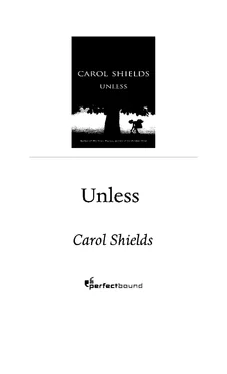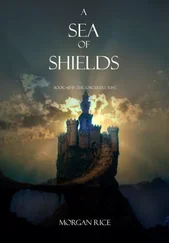Carol Shields - Unless
Здесь есть возможность читать онлайн «Carol Shields - Unless» — ознакомительный отрывок электронной книги совершенно бесплатно, а после прочтения отрывка купить полную версию. В некоторых случаях можно слушать аудио, скачать через торрент в формате fb2 и присутствует краткое содержание. Жанр: Современная проза, на английском языке. Описание произведения, (предисловие) а так же отзывы посетителей доступны на портале библиотеки ЛибКат.
- Название:Unless
- Автор:
- Жанр:
- Год:неизвестен
- ISBN:нет данных
- Рейтинг книги:4 / 5. Голосов: 1
-
Избранное:Добавить в избранное
- Отзывы:
-
Ваша оценка:
- 80
- 1
- 2
- 3
- 4
- 5
Unless: краткое содержание, описание и аннотация
Предлагаем к чтению аннотацию, описание, краткое содержание или предисловие (зависит от того, что написал сам автор книги «Unless»). Если вы не нашли необходимую информацию о книге — напишите в комментариях, мы постараемся отыскать её.
Unless — читать онлайн ознакомительный отрывок
Ниже представлен текст книги, разбитый по страницам. Система сохранения места последней прочитанной страницы, позволяет с удобством читать онлайн бесплатно книгу «Unless», без необходимости каждый раз заново искать на чём Вы остановились. Поставьте закладку, и сможете в любой момент перейти на страницу, на которой закончили чтение.
Интервал:
Закладка:
When I try to imagine Tracy looking at Norah, I understand that she sees no one. For a minute I was Norah. Norah the anchorite, Norah the outcast. I trembled with the thought of what Tracy might think of me.
The real Norah failed to respond, she sat all day with the jar of marbles beside her, and left them there when she returned to the hostel that night. In the morning, apparently, they were gone. I’m not sure what I think of this exercise. Someone told me the marble idea was floating around on the Internet. People wander into the Internet seeking diversion and instead they get a pelting of hard fact and gusty inspiration about the wonderfulness of life. Is this marble-counting exercise a recipe for savouring time or is it a cutting reminder that time cannot, however much we wish it, repeat itself?
I can go for months without seeing Emma Allen, who is a journalist in St. John’s, Newfoundland, but just five minutes in her presence persuades me that she is the one person in the world I can tell everything. “Norah is alive,” Emma said to me when she was passing through last week — my dear Emma, whose son died of a heroin overdose at age twenty-two.
“Her limbs are intact. She hasn’t mutilated herself or even shaved off her hair. She isn’t drunk, she probably isn’t on drugs. She’s not shouting obscenities or spitting on strangers.
You, her parents, know precisely where she is and something of her routines. That’s the thing to remember, that you’re still connected to her in time and space.”
Professor Hamilton, who taught the Flaubert course in which Norah had been enrolled, said: “She was an excellent student, until she stopped coming to class. This was not long before exams. March twenty-eighth, she was at the March twenty-eighth lecture, I’m almost sure. But you know, many students fall away once the good weather begins. She was always alert and inquiring. Well, yes, we did have one or two altercations, you know how things go these days. Could Flaubert possibly imagine himself into a woman’s life? The class divided on that issue, it happens every year. Norah saw Madame Bovary as a woman blandly idealized by Flaubert, and then reduced to a puff of romanticism, and capable of nothing else but kneading her own soft heart. Your daughter’s view, and it is a perfectly viable view, was that Madame Bovary was forced to surrender her place as the moral centre of the novel.
Others, needless to say, disagreed.”
Tom doesn’t say so, but he sometimes intimates that Norah is manipulating us. Either that or punishing us for some reason. I resist this interpretation. Tom goes every Friday morning to see her on the way to his trilobite research meeting — he is the only “lay” member of this small group — at the University of Toronto. He’s given up talking to her. Now he just sits with her for half an hour, on a folding chair he takes along for that purpose, and slips her money in an envelope. Cash, not a cheque. Norah lives outside the realm of cheques and banks and signatures, even though there’s a bank on the corner where she sits and another across the street. Is it when he’s counting out the twenties that Tom thinks: manipulation?
An old school friend, Gemma Walsh, an active member of the United Church, has written to tell me that Norah’s name has been added to an all-Ontario prayer list. I send her back my sincere thanks, which I sincerely mean. I didn’t know I had this depth of sincerity in my soul.
I thought sincerity had gone from our generation, driven out by post-sixties disillusionment and the marketplace.
Marietta Glass, Colin Glass’s estranged wife, writes from Calgary, quoting Julian of Norwich: “All shall be well, and all shall be well, and all manner of things shall be well.”
Meaning all is well for the moment and for the moment that follows and the moment after the moment.
Danielle Westerman, with her adamantine certainty, has not swerved from her view that Norah has simply grown into the knowledge of her powerlessness and doesn’t know what to do with it. “Subversion of society is possible for a mere few; inversion is more commonly the tactic for the powerless, a retreat from society that borders on the catatonic” ( Alive, 1987, p.
304). I wasn’t inclined to believe this statement when I first translated it, but now I believe it absolutely. Danielle’s hypothesis has moved into my body and occupies more and more space.
Only
December 2, 2000
Dear Dennis Ford-Helpern:
I have recently finished your book, The Goodness Gap, and felt an impulse to put down my impressions. It’s taken me a long time to read this book and digest it. (I’ve had to renew it twice at the public library.)
I was stunned, to say the least, by your theory of goodness being a kind of problem solving. As I interpret your text and epilogue, you see moral dilemmas sprouting like tables and chairs on the sidewalk, growing ever more quickly, nourished by advances in technology and by the decay of the ecosystem. Solutions to serious moral questions inevitably lag behind the problems that arise, hence the “gap.” Your fourteen chapters sketch out examples of successful or unsuccessful problem solving. Closing the gap is dependent on quick resolution, sideways thinking, general creativity. All the problem solvers in your examples are men, all fourteen. I consulted the index and found that women are scarcely cited at all. This seems a moral dilemma in itself, don’t you think?
Listen to me, how I natter on, just like — just like a woman, the way I fluff up my fantasies of persecution. It happens that I am a woman and the mother of a nineteen-year-old daughter, twenty in May, who is deeply troubled. She is alienated from our family and from society. We don’t know the cause of Norah’s malaise, but I am more and more persuaded that she is reacting — morally, responsibly, the only way she can — to a withholding universe.
What she sees is an endless series of obstacles, an alignment of locked doors. Yet, goodness is exactly what she is seeking, the nature of goodness, how we learn to be good and what that means.
I don’t think you intend to be discouraging in your book. I think you have merely overlooked those who are routinely overlooked, that is to say half the world’s population. By the way, you may not be able to catch my tone in this letter, but I am trying to put forward my objection gently. I’m not screaming as you may think. I’m not even whining, and certainly not stamping my little lady-size foot. Whispering is more like it. The last thing I want is to be possessed by a sense of injury so exquisitely refined that I register outrage on a daily basis.
Anger is not humanizing. It’s a rehearsal for the performance that never arrives. Try to imagine my particular realm of feeling at this time of trouble and my belief that there is a circuitry linking your philosophical approach and my daughter’s resignation from life, her consignment to dysfunction. Probably you will dismiss this as a crank letter from one of those women who go around begging to be offended, but you must understand that I am trying to protect Norah, and her two younger sisters, Christine and Natalie, who want only to be allowed to be fully human. And you should know, as I set down these words, that I am shaking like a tree of nerves.
Yours, Rita Orange d’Ville
Unless
“‘Virtue is performance,’” I said to Danielle Westerman on Wednesday when we had lunch in her sunroom. “A form of acting. Someone said something like that, but I can’t remember who.”
“Yeats, I think,” she said dreamily, stretching in her chair.
“Yes, Yeats.”
She is a woman with twenty-seven honorary degrees and she’s given the world a shelf of books. She’s given her thoughts, her diagram for a new, better, just world.
Читать дальшеИнтервал:
Закладка:
Похожие книги на «Unless»
Представляем Вашему вниманию похожие книги на «Unless» списком для выбора. Мы отобрали схожую по названию и смыслу литературу в надежде предоставить читателям больше вариантов отыскать новые, интересные, ещё непрочитанные произведения.
Обсуждение, отзывы о книге «Unless» и просто собственные мнения читателей. Оставьте ваши комментарии, напишите, что Вы думаете о произведении, его смысле или главных героях. Укажите что конкретно понравилось, а что нет, и почему Вы так считаете.












